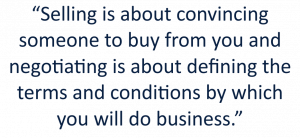Don’t Negotiate Before the Selling is Done
By Joe Hernandez
As I sat there in front of the Purchasing Manager of this major technology and communications company, I couldn’t help but wonder how things got so ugly. He was raking me over the coals, trying to intimidate me, and demanding a reduction in price in order to be considered going forward.
He was a master at commoditization. He said, “I’m looking at three other vendors that do what you do, and we have an incumbent  provider…so if you want a shot here…you are going to have to delight me with your pricing.” I hadn’t even had a chance to open my mouth and do my job as a sales professional. I was frustrated.
provider…so if you want a shot here…you are going to have to delight me with your pricing.” I hadn’t even had a chance to open my mouth and do my job as a sales professional. I was frustrated.
So, I asked the Purchasing Manager if we could reschedule the meeting. I told him I felt unprepared for our discussion and would appreciate the opportunity to come back when I was better prepared. He agreed.
I stepped out of his office and walked down the long corridor to the elevator that would take me to the garage. I was ashamed that I hadn’t handled the situation better.
I got into my car and before I started it, I sat in silence and thought to myself…who is gonna care?…who at this company is going to care about our great solution and probably the best ROI of any other vendor out there including the incumbent provider. Then it came to me. It was the people that were going to use the technology and feel the impact on their business.
So, I made it a point to find those people and sell them. And, I did.
As part of the selling process, I made a request; “I have made a lot of commitments to you about what our solution can do for efficiency in your operations…I’ve even given you an ROI that you can expect to achieve by deploying our solution in your organization. But I have a request…would you come with me when this goes to purchasing for completion of our agreement?”
“Oh no!” He said. “We don’t do that here. There’s like an invisible wall, and they don’t want us on the other side of the wall. The process with Purchasing is highly engineered and they don’t even want us to set foot in their department.”
 “I know,” I replied. “I’ve been on the other side of the wall and I know exactly what’s going to happen. They are going to commoditize me and try to squeeze me on one deal element…price! At which point, I will be forced to rescope, remove capabilities, and eliminate the elements of the solution that will drive the ROI you are looking for! If that’s what you want me to do, then aren’t we wasting each other’s time?
“I know,” I replied. “I’ve been on the other side of the wall and I know exactly what’s going to happen. They are going to commoditize me and try to squeeze me on one deal element…price! At which point, I will be forced to rescope, remove capabilities, and eliminate the elements of the solution that will drive the ROI you are looking for! If that’s what you want me to do, then aren’t we wasting each other’s time?
Is this a problem that’s worth fixing? Is it really a priority for you? “Yes!” He said.
“Then come with me!” I suggested again. “Ok, I will.” He replied.
So, there we were a week later in front of the same Purchasing Manager. And, as soon as we sat down, the commoditization process began again. I looked over at the person I just sold and said, “This is exactly what I was concerned about. How do you want to proceed? “ I asked. The response was amazing. He told the Purchasing Manager that he couldn’t afford for the solution to be rescoped or reduced in capability in any way. As a result, we ended up with a great outcome. And, so did they…the ROI was terrific.
But that’s when this hard-learned lesson hit me. The selling has to be done before the negotiation begins…and the people that you have sold must be at the table.
It became clear that selling and negotiating were two separate and distinct disciplines that require unique training and experience. Selling is about convincing someone to buy from you, negotiating is about defining the terms and conditions by which you will do business…once you decided you want to do business together. I was really good at selling, but not so good at negotiation.
From that point on, I became a student of negotiation. And I made sure that I didn’t start negotiations until I knew the selling was done. It has made all the difference in the world. My deal outcomes improved dramatically.
 Recent research conducted by the Objective Management Group of almost 2 million sales professionals identified that 13% of sales professionals have a competency in negotiating. Our experience proves that it’s probably worse…more like 4%. That is a staggering statistic! What’s more problematic is that deals are made or lost in the negotiation stage of the deal-making process.
Recent research conducted by the Objective Management Group of almost 2 million sales professionals identified that 13% of sales professionals have a competency in negotiating. Our experience proves that it’s probably worse…more like 4%. That is a staggering statistic! What’s more problematic is that deals are made or lost in the negotiation stage of the deal-making process.
Further, you put our company’s financial well-being in the hands of sales professionals that have no idea how to consistently negotiate great deal outcomes.
How to tell if your salespeople lack negotiation skills…
The data above illustrates that while sales professionals may be great at selling, that doesn’t mean they are great or even good a negotiating. Here are some tell-tale signs that your salespeople are not competent negotiators:
1. They negotiate only on price.
2. They give away too much to win a deal.
3. They don’t push back on unreasonable “asks.”
4. They have no plan for how concessions should be made.
5. They don’t prepare for the negotiation.
Here’s how selling and negotiating are different…
Selling is about convincing prospects that you are the best company to meet their needs. It involves, at a minimum, the following steps:
• Prospecting – to find opportunities to pursue.
• Qualifying the prospect – to determine if there is really a problem and a desire to fix it.
• Identifying the right people – this includes the decision-makers and the influencers.
• Getting to the right people to begin the dialog about requirements, expectations, success parameters, prioritization, and willingness to take action.
• If they are willing to take action, now is when you begin discussions about your value proposition or your distinctive competency…the thing(s) that separate you from everyone else in the industry.
• If you are successful, you can ask the prospect, “If we can get the terms right, do you feel like we are the best company to meet your requirements?” If the answer is yes, the selling is done and you can proceed to the negotiation.
So, what is negotiating?
It is determining the terms and conditions by which you will do business together. It is identifying how you will work together to meet each other’s business goals. And, it requires an entirely unique set of skills. Here are a few of the unique skills competent negotiators need to master:
• They know how far they can push the other party before they walk away
• They know how to target a great deal outcome
• They know how to identify the table stakes for the negotiation
• They know how to construct offers to ensure the best outcomes
• They know when it’s time for them to walk away
• They have a concession strategy
• They have a set of metrics to help them measure how well they are doing in real-time during the negotiation.
This realization about the difference between these skills is critical to getting great deal outcomes. It becomes even more important to understand that sales professionals should not even start to negotiate until the selling is done. In other words, they shouldn’t be discussing how to do business with one another until there is an agreement that you want to do business together.
What happens if you start negotiating before the selling is done?
There is one big symptom that typically presents itself when we start talking to a prospect about how we will do business together before we have an indication that they want to do business with us.
That symptom is that the negotiation becomes primarily based on price. It becomes a price only negotiation. The reason is simple. If you haven’t differentiated yourself as the chosen provider, then you are just like everyone else vying for their business. You are still a commodity. And, if you are considered a commodity by the prospect, then the only way that can differentiate you from everyone else is…price. It is an automatic response driven by basic commodity economics.
If you’re not sure if you or your team has the skills to effectively negotiate great deals, take this short 5-minute competency quiz.
